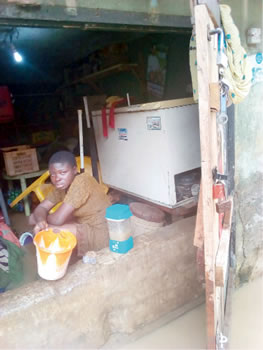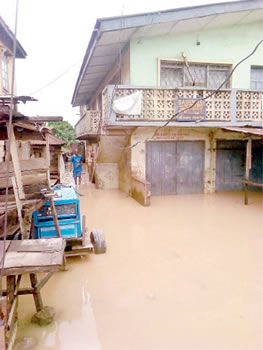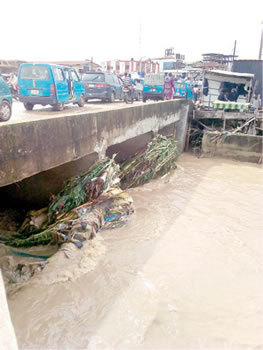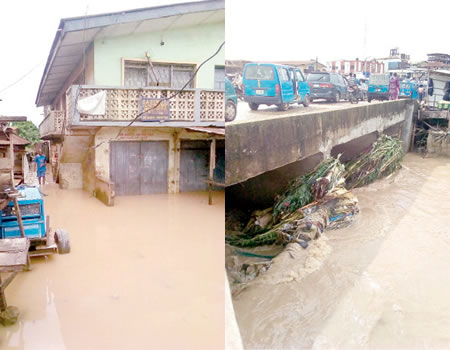The downpour that lasted five hours in Osogbo, the Osun State capital on Tuesday left a horrible mark in its trail. AKINWALE ABOLUWADE reports that residents of the city continue to count their losses just as the state government battles the perennial problem of flooding in parts of the state.
When residents of Osun State living in flood prone areas were advised to relocate to a safer haven in order to avert the impending danger of flood disaster, not many of them heeded the warning. However, scores of the people were caught napping on Tuesday, October 8 when an early morning rainfall increased in intensity and resulted in disasters. Although no life was lost, properties worth millions of naira were lost by residents in flood prone communities across the state.
In Osogbo, the Osun River goddess city, several communities were affected by the flood that trailed the rainfall. When Saturday Tribune went round the city shortly after the rain, rivers and canals had overflowed their banks, streets were flooded and bridges were submerged by water while some structures were destroyed. Traders whose wares were destroyed by the flood were seen counting their losses; some were bailing flood water from their shops while many others were carrying their wares out of flooded buildings. Some parents were seen running round to ascertain the safety of their children at school while many others waited outside for the water to recede before going into their houses.
Gbodofan community, Ibu Amo, Rasco area at Oke-Fia, Gbanmi and Alekuwodo were the most affected places in Osogbo. A shoe dealer at house IM4C, Rasco, Oke Fia, Hammed Ganiyu, and many others with similar experience still lick their wounds in agony.

Ganiyu, a native of Erio in Ekiti State, lamented that the flood had damaged virtually all his stock. Explaining that he started selling shoes in the building that got flooded since his arrival in Osogbo 19 years ago, he said: “This is not the first time that I am experiencing losses as a result of flood, but I decided to stay on because I cannot afford to rent a shop in a better place. I have been trading here since year 2000.
“Unfortunately for me, I just got a loan through a cooperative scheme popularly called ‘gbomule lantern.’ The condition that is attached to the loan is very harsh and unforgiving because you will either refund the loan as and when due or pay with a pound of flesh. As we speak, I am expected to start to liquidate the loan on installments from Friday and the repayment plan is weekly. With the losses that I suffered, it will not be possible for me to meet up with the repayment plan and that attracts very severe consequences.
“My stock that was affected is valued at N130,000. I am expected to return the loan by paying back the sum of N4,500 every week. Some of my co-traders in this building also lost goods running into hundreds of thousands. Among them are repairers of power generating sets, photographers etc. I learnt that several items in their shops got damaged by flood.”
Legislative agenda: Buhari tasks NASS on good legislations
Ganiyu, who explained that some of the traders were still at home while others were just on their way to the shop when the rain started, said that “Some good Samaritans called us on the telephone to alert us about the flood. We ran down immediately to salvage some of our property but by the time we got here, it was impossible for us to enter our shops as a result of the water level. The water level within the compound was so high. We had to wait patiently for the water to recede for fear of being swept away by the flood.
“By the time we got into the shops, many things had got damaged. The shoes in my shop, including sandals, canvas and cover shoes, were all soaked. The white shoes had become dirty and no-one would want to buy them. I am at the crossroads; I am very confused. It is as if the whole world is crashing on me. People are telling me not to feel too bad because my life was not involved but the question that I am asking myself is where do I go from here? How do I get the loan paid, and would my family survive this challenge?”
Recalling that the state government had embarked on the expansion of the canal barely a week ago, Ganiyu said: “What I can say is that the state government should come and assess the impact of the flood. While we cannot say that it was their fault, I will suggest that they should build concrete walls at the sides of the canal in order to check a repeat of what happened.”
Like many others living or trading close to river banks in Osogbo, Ganiyu said that he once suffered a terrible fate on July 7, 2007 as a result of the flood that washed away some of his wares after the downpour. That year, he said that he lost goods worth N300,000. “I can never forget that year because it was a big loss for me. But the difference between the loss that I suffered that year and now is that I was trading with my own money then; I did not take any loan. But this time, the entire capital was borrowed.”
‘Railways’ abandoned dam to blame’
Mr Adeyemi, the proprietor of Adeyemi Photos, Oke-Fia, Osogbo, also had a bitter experience in the aftermath of the 5-hour-long downpour. Adeyemi, who disclosed that he had been plying his trade at a building near Rasco Cinema for 40years, said some of his studio equipment got damaged by flood. When visited, his apprentices were seen carrying some of the affected equipment out of the building. Although it was not the first time his shop was flooded, the man said he did not envisage the incident, “because the canal beside the house was dredged by the state government just last week.
“We had thought that this would prevent flood but the water overflowed its banks and flooded everywhere when its channel got blocked by refuse. The debris was washed from the bank of the canal.”
He said that the flood being experienced annually in the area could also be linked to the overflow of Dam 264 at Ago Wande/Oke Onitea area of Osogbo. The dam, he said, became redundant when the Nigeria Railway Corporation (NRC) stopped using the water for its operation. He said: “The result of that is occasional flood disaster whenever the dam overflows its banks. The dam was built in the 60s for the use of the Nigeria Railway Corporation but now that they no longer use the water, I think that the dam should be rehabilitated to supply pipe-borne-water to the citizens.

“We suffered huge losses but I thank God that our camera was not affected. Most of our tools that were affected could still be repaired. Although government tried by dredging the river, we still want them to come and assess the situation in order to find a lasting solution to the problem. We thank God that no life was lost but this brings to mind the sad events of the past when the water flooded houses and there were many casualties. One of them was an octogenarian called baba Kariola. The man was in his own house but was sadly washed away by flood some years ago. We should try and prevent a repeat of such occurrence.”
Some residents of Ibu Amo community are still picking the pieces of their lives together many days after the downpour having been displaced from their shops and shelters. The Baale of Ibu Amo community, Chief Fatai Sunmonu, said his community suffered serious losses as the flood submerged a bridge in the area.
“Our homes were flooded and many of our properties got damaged. My block making site was eroded and many blocks and pallets were washed away. The rain started around 7:00am and continued till 1:00pm in my area. The previous experience that we had was on October 10, 2010. The flood of August this year did not destroy as many things as the one on Tuesday.
“So many things were damaged by the flood but we are thankful to God that no life was lost. After the flood in August, the governor visited the affected areas and promised that measures would be taken to guide against flooding. We are expectant.”
‘I lost my water tank’
A carwash operator at Ibu Amo, Olamide Olaniran, described the losses that he suffered as a result of the flood as devastating. Olaniran, who is operating his centre near the bridge, at Ibu Amo, close to Osun River, said: “ I lost my water tank valued at about N22,000 as well as some of my washing materials. The greatest loss that I suffered was the damage to the floor at the carwash. This is where I get my daily bread. Presently, part of the floor has been washed away and I need some money to build a concrete platform for me to be able to operate. I make an average of N3,000 per day as I charge between N300 to N400 on each car; I wash about eight vehicles per day. Presently, there is no hope for me because there is nowhere for me to operate.”
Some butchers in the area also bemoaned their losses in the aftermath of the Tuesday downpour. One of them, Mr Kehinde Animashaun, said that the shed under which they plied their trade had been washed away by flood. Animashaun said the state government should rise to the aid of the people in order to avert more serious natural disaster.
“Shortly after the downpour on Tuesday afternoon, two commercial motorcyclists nearly got drowned at the bridge. But for the quick intervention of the people, the story could have been tragic. We were able to help them and we recovered their motorcycles from being washed away by the flood. We are happy that a team of firemen were dispatched to the bridge to prevent people from taking the risk of crossing the bridge because it was submerged.”
During Saturday Tribune’s visit, the auditorium of the Overcomers Christian Church at Oke Fia, Osogbo was flooded while the makeshift structure of the Christ Apostolic Church, Abija area of the city was also affected. It took several hours for some members of the Overcomers Christian Church to bail out the water from the building. Pastor Morakinyo Alamu of the CAC church urged the state government to find a lasting solution to the perennial flood disaster in the area, saying that “further delay might be costly.”
Baale blames flood on people’s ‘attitude’
The Baale of Gbodofan, Osogbo, Chief Jimoh Buraimoh, noted that the flood disaster of this year was largely as a result of attitude of the people. According to him, despite the warning by the state government about the possibility of flood in parts of the state, those living close to flood plains did not take necessary precaution.
Chief Buraimoh said: “At Gbodofan, I can confirm to you that this year, we have not experienced flooding. The reason is that the inhabitants of my community prepared ahead so as to avert disaster.
“First, the administration of former Governor Rauf Aregbesola had embarked on a massive flood control by dredging the volatile parts of the Osun River channel. He did that twice while in government. Gbodofan is bordered by the Osun River, so we were experiencing flooding in the past.
“My house is the first building at Gbodofan when you enter from Orita Olaiya-Jaleyemi Road. Ahead of the rain, however, I personally built a drainage channel in front of my house and it runs down. It cost me about N1.5 million. Another fellow in the community also took it from his house and it runs down. That saved us from the usual embarrassment.
“Of course, government can still do more but you will see that in most cases, the people don’t complement government’s efforts in fighting flooding. Whoever decides to live close to water must be prepared to fortify his area in order not to fall victim of rainfall.”
Chief Buraimoh, who disclosed that he settled at Gbodofan community in 1968, said that the name of the community was derived from the experiences of the people over the years. He explained that the river bordering the community had swept away many people, majorly children and property worth millions of naira had perished in the flood.
We’ve been proactive —Govt
The state government indicated that it paid visits to the affected areas to assess the extent of the damage and to find a lasting solution to the perennial problem. Mr Ismail Omipidan, Chief Press Secretary to Governor Adegboyega Oyetola, said: “You will recall that in September when we saw a semblance of flood within the state, the first thing that government did was to immediately commence dredging of rivers and waterways.

“You will agree with me that but for that proactive action, probably the situation would have been worse than what we witnessed on Tuesday. First, we commiserate with those who may have suffered one loss or the other but, we thank God that no life was lost.
“Don’t forget that before now, we had advised those living very close to river banks and are prone to flooding that they should temporarily leave those areas. I think a lot of people complied and I am sure that is why we have not recorded any loss of life.
“We have also been appealing to residents that the indiscriminate dumping of refuse usually causes blockages. We all know the power of water; once you block water from flowing freely, it will, certainly, look for a way to flow.”
He explained that during the construction of major roads in the state, government always ensured that wide drainages were built. This, he said, had helped in reducing the impact of flood. Omipidan said: “Apart from dredging, government has warned that any structure that obstructs the course of the water would be demolished. For those who suffered losses as a result of the flood, we want to assure that as a responsive and responsible government, we would do everything possible to ensure that whatsoever it is that they must have suffered, they would never suffer it anymore.”
To curb indiscriminate dumping of refuse along the water channels in the state, he said that the state inaugurated a waste collection system. “We do have waste collectors and government has charged the agency that is responsible to ensure that their activities are well monitored. It is not peculiar to Osun State; it is everywhere. Even when there are things to be done, people still want to be reminded of our roles in carrying out our responsibilities. Government is also thinking of bringing back sanitary officers popularly called ‘wole wole’.
“It is believed that they would help in ensuring that the environment is clean through effective waste disposal.”
According to him, after dredging, the banks of canals would be fortified to avert flooding. He said that before government’s intervention, lives were being lost during raining season in flood prone areas like Gbonmi, Gbodofan and Ibu Amo in Osogbo.
“You need to go and ask the people of Gbanmi what the situation was in the past. As the name of the place suggests, every year, their shelters were always flooded and they would wait for water to recede and then begin to bail water out of their homes. Go and see what the government has done there today; you will see construction of massive drainage in that place. Government is conscious of its responsibilities as far as the welfare of the people is concerned.”
He, however, added that as part of the ecological challengesbeing faced in the country, the state alone cannot address the problem saying that the state government had called on the Federal Government to come to its aid.






